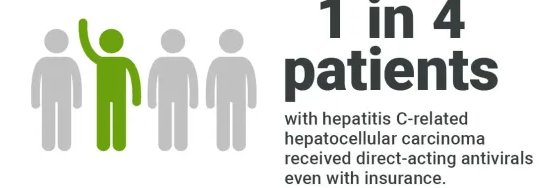
Only a quarter of individuals diagnosed with hepatocellular carcinoma (HCC) linked to the hepatitis C virus (HCV) undergo treatment with direct-acting antiviral therapy, even when covered by insurance, according to a recent study presented at The Liver Meeting in Boston. The research, conducted by Dr. Leslie Yeeman Kam and colleagues from Stanford University Medical Center, revealed that although this therapy significantly enhances overall survival, its utilization remains limited in the real-world scenario.
READ: “Discover 5 Incredible Advantages of Consuming Ghee and Jaggery Post Hearty Meals!”
Over the past decade, oral direct-acting antivirals have revolutionized HCV treatment, boasting a cure rate exceeding 90% and proving well-tolerated in advanced liver disease patients, including those with HCC. Despite the demonstrated efficacy in improving survival among HCC patients treated with direct-acting antivirals, the study emphasized that their effective utilization in the broader patient population is uncertain.
Hepatitis C
Analyzing data from a nationwide U.S. study, the researchers identified a treatment rate of 25% among HCV-related HCC patients, even among those with insurance coverage. The retrospective study, spanning from 2015 to 2021, involved 3,922 adults with HCV-related HCC, of whom only 23.5% received direct-acting antiviral therapy. Factors influencing treatment rates included the presence of cirrhosis, age, and the type of healthcare provider, with gastroenterologists or infectious disease specialists exhibiting higher treatment rates.
Multivariable logistic regression analysis indicated that younger age, specialist care, and the presence of cirrhosis correlated with increased odds of receiving direct-acting antiviral treatment. Notably, individuals receiving this therapy demonstrated a significantly higher 5-year survival rate compared to those without treatment (47.2% vs. 35.2%).
Despite having private insurance, disparities in treatment rates persisted, particularly among racial and ethnic groups, with Black patients experiencing lower survival rates. Dr. Kam emphasized the low awareness of HCV and the underutilization of direct-acting antiviral treatment, even among patients seeking care from specialists. The study concluded that increasing awareness and improving the use of direct-acting antiviral therapy are crucial for enhancing outcomes in HCV-related HCC patients.




